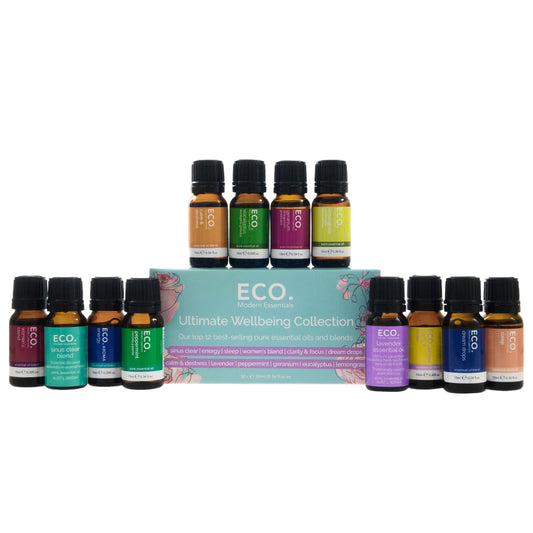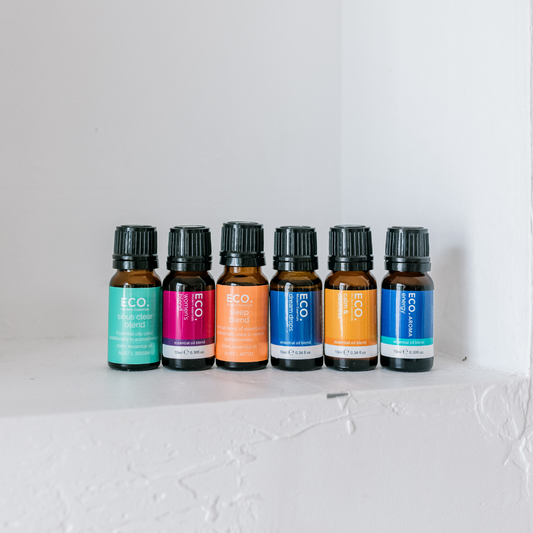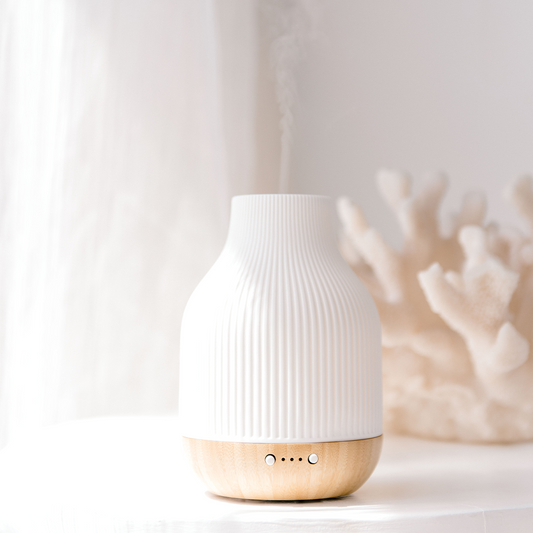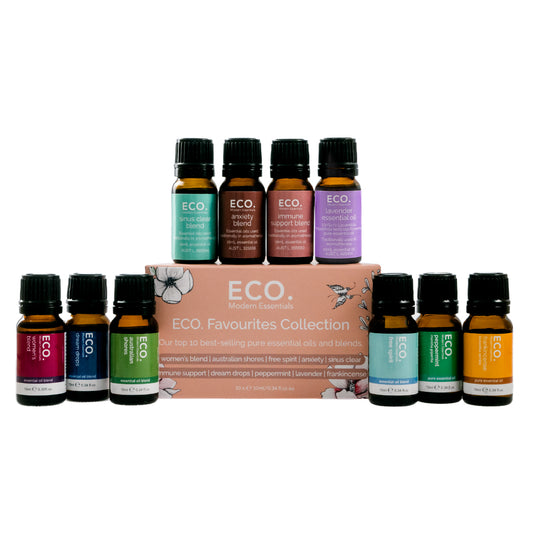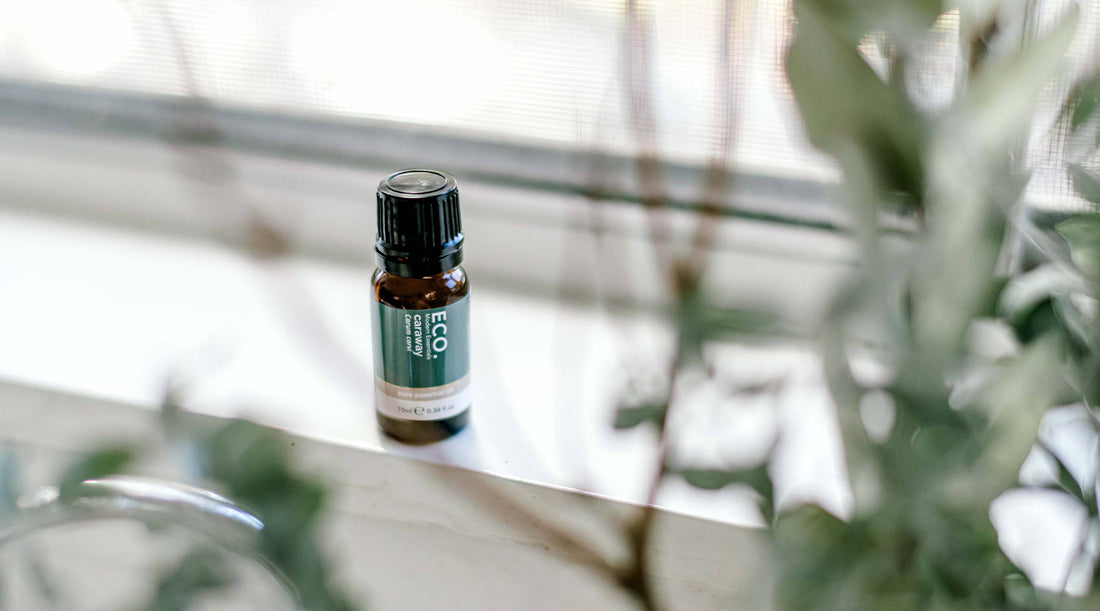
Benefits & Uses of Caraway Essential Oil
Caraway essential oil is not always the ‘go-to’ choice when we are deciding which essential oil to use. Take a moment to discover the big health benefits this tiny seed has to offer.Caraway provides powerful relief to many digestive issues and it has likely been used by humans for a least 8000 years.
Where is Caraway essential oil from?
Our Caraway is sourced from Hungary and Finland. The plant originated in Europe and Western Asia and is now cultivated in many countries including Holland, Germany, England, India and Polland.
Carum carvi grows to around 50 to 100cms high and has soft feathery foliage that looks like carrot leaves. The flowers are tiny white or pink buds that grow in an umbrella configuration. The flowers give way to fruit that eventually ripen into oblong shaped seeds. These small seeds have ridges around it and is where the essential oil is found.
How is Caraway essential oil made?
Caraway essential oil is produced by steam distillation. The ripe and dry seeds are ground into a powder and placed into a distillation container. Distilled water is then added to the powder and the mixture is heated to boiling point. The steam rises into cooling vessels where it returns to water and essential oil. The fresh essential oil is collected ready for bottling. The hydrosol of caraway tends not to be used for aromatherapy purposes. The yield of essential oil from caraway seeds is about 1 to 6 %.
What does Caraway essential oil smell like?
Caraway essential oil has a unique aroma. The very dry and medicinal herbal scent is highlighted with hints of fennel and slightly sweet undertone. The essential oil faithfully captures the fragrance of caraway seeds.
History of Caraway
There is a long history of Caraway use in food and drink preparations, for medicinal purposes and as a popular ingredient for magical use. Fossilised caraway seeds give us the earliest evidence of Caraway use.These seeds were found in a debris pile left by people who settled around the Swiss lakes region about 8000 years ago. Caraway seeds have also been found in 3000-year-old Egyptian tombs.Romans used the spice in their cuisine and most popularly served the seeds dipped in sugar to aid digestion after a meal. Galen, a famous Greek physician, notes the heating and drying properties of the plant in his work written in 165 AD. Culpepper recommends the warm and spicy nature of Caraway as a remedy for head, stomach, and intestinal complaints.
In Folklore, Caraway seeds are said to have the power to help us hold onto what we already have. Traditionally, a few seeds were sprinkled into valuable items to prevent them from being stolen and this tradition continues in modern magical use where practitioners are recommended to sprinkle caraway seeds in their car to deter thieves. The seed forms a part of a medieval love potion which would prevent a lover from straying or placed near a newborn’s crib to protect them from malevolent spirits.
Caraway is most frequently used in cooking. The seeds add a distinctive flavour to bread, cheese, preserves, sauerkraut, and as a flavouring to alcohol such as Benedictine, Kummel and Grand Chartreuse. The flavouring is also used in some medicines and oral health products such as toothpaste and mouthwash.
Benefits & uses of Caraway essential oil:
- Antispasmodic: may help reduce cramps and tummy pains caused by spasming in the intestines. May also alleviate wind pains.
- Appetite: may help restore an appetite after fasting, illness or a stressful episode.
- Indigestion:may improve indigestion by supporting liver and gall bladder function.
- Fluid retention:reported to reduce fluid retention due to a mild diuretic action.
- Respiratory system: eases blocked sinuses and congested lungs with expectorant properties.
- Reproductive health:Caraway’s warming properties are thought to help ease period pain and encourage menstruation. (Note: the are no warnings about using Caraway essential oil during pregnancy.)
- The Centred Mind: Caraway’s spicy aroma is said to help ground a wayward mind and promote feelings of safety and security. May be useful to create calm during hectic mornings or when feeling anxious or stressed.
How to use Caraway essential oil
- Massage: add up to 2.5% dilution to your massage blend (5 drops per 10ml carrier oil).For digestive system complaints a higher dilution of 5% (10 per 10ml carrier oil) may be used daily for no longer than 3 weeks.
- Diffuser: add 6 to 8 drops of Caraway essential oil to your diffuser to create a grounding atmosphere for an overactive mind.
- Steam: add 1 to 2 drops of essential oil to steaming hot water to help clear lungs and sinuses.
- Compress: add 2 drops of essential oil to a bowl of warm water. Agitate a face washer in the water and wring out excess moisture. Apply compress to abdominal area to ease digestive complaints or period pain. Compress with very warm water to help warm up and improve circulation.
- Quick fix: a few deep inhalations from the bottle may help reduce feelings of nausea or encourage a weak appetite.
- Shower: add a few drops of Caraway essential oil to a face washer and place in the corner of the shower. The heat from the water will evaporate the essential oil leaving you to enjoy a warming and grounding steam bath.
- Blending: Caraway has a distinct aroma that blends well with many essential oils. It has a moderate odour intensity level that won’t overpower your aromatic creation. Caraway essential oil adds subtle spicy warm undertones to a blend. Caraway blends well with Bergamot, Black Pepper, Cedarwood, Cinnamon, Eucalyptus, Frankincense, Geranium, Grapefruit, Lavender, Lemon, Lime, Peppermint, Pine, Spearmint, Sweet Orange.
Caraway essential oil safety
Caraway essential oil is considered non-toxic, although it may be irritating to the skin if used in very high concentrations.
Caraway chemistry class
Caraway, along with Spearmint and Dill essential oils contain around 50 to 60% of a compound called carvone. Carvone is thought to ease digestion, improve menstrual flow, and act as an expectorant. Other research indicates that carvone may increase relaxation and decrease pain reception through its effect on the central nervous system.






